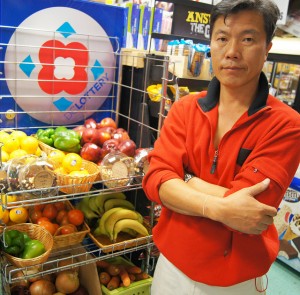April 10, 2012 | 12:53 PM | By Elahe Izadi
Asian Shopkeepers And The Economics Of Improving Corner Stores
FILED UNDER: Health, Asian Americans, D.C. Central Kitchen, Food Deserts, Gary Cha, Immigrants, Marion Barry, Small Business, Ward 8

A D.C. shopkeeper poses by his "Healthy Corners" stand. D.C. Central Kitchen's program delivers fresh produce to corner stores.
The fallout continues over comments Councilman Marion Barry made about Asian-owned stores in Ward 8, calling them “dirty shops.” Barry has since issued an apology, but a coalition of local and national Asian American groups have called for more meaningful engagement.
Part of Barry’s follow-up comments focused on the unhealthy foods such stores sell, and he called for the owners to sell healthier foods and fix up their stores.
Gary Cha, owner of Yes! Organic Market and former president of the Korean American Grocers Association, appeared on Monday’s The Kojo Nnamdi Show to discuss Barry’s comments and relations between black and Asian communities in D.C.
Cha spoke with DCentric after the show and reiterated that a common perception of store owners among customers is that whatever goes into the register is profit. But many take home only 6 to 7 percent of sales, Cha said. If a store makes $1 million a year, the owners take away about $60,000 for their families.
“These are people who are barely getting by. I know several of them that to make ends meet, they don’t even have health insurance,” Cha said. “So when we ask them to renovate and do this and that, they probably don’t have the financial ability to do that.”
Stocking up with healthier foods, particularly fresh produce, does require investment by store owners. Refrigeration units are needed, which can be costly and difficult to accommodate in small stores. Also, small stores may not qualify for wholesale produce prices.
Nonprofit D.C. Central Kitchen runs a program that addresses these problems. The Healthy Corners program uses a $300,000 grant from the city to regularly deliver fresh produce to corner stores throughout D.C.’s food deserts. Nine of the participating stores are in Ward 8.
But rather than just focus on the lack of health foods in such stores, Barry singled out Asian-owned stores. By bringing highlighting race as an issue, Barry took the discussion beyond pure economics. So did a number of callers to The Kojo Nnamdi Show who complained that Asian retailers are rude or treat customers poorly.
Cha said that not all Asian storeowners have bad relationships with the community, such Martin Luther King Grocery’s Peter Cho (whom, coincidentally, Barry referred to as “a good Asian” over the weekend). Cho runs a regular back-to-school event in Ward 8, giving away backpacks to neighborhood kids. He also participates in Healthy Corners.
Communication issues aren’t a problem just for “Asian retailers, but pretty much all immigrants in the community,” Cha said. “The immigrants have the same issue where there’s a language barrier, and also the cultural differences they haven’t quite grasped. It’s just a process they go through. I don’t know how to close that gap real quickly.”
One thing Cha does suggest: if you want to see a different kind of product in your store, such as multigrain bread, try asking the store owner to carry it.
“Any time there’s a dialogue going back and forth, it helps,” Cha said.
MORE POSTS ABOUT
- Health
- Asian Americans
- Food Deserts
- Immigrants
- Marion Barry
- Small Business
-
Marion Barry: Breaking Down Race, Plexiglass And 'Dirty Shops'

Councilman Marion Barry’s criticisms of Asian-owned stores in Ward 8 set off a whirlwind of criticism and debate Thursday. Here’s the rundown: Barry made some offhanded remarks after he won the contested Ward 8 council seat race, captured by NBC4 Washington: “We’ve got … Read More
- HIV Rates Among Black Women In Cities Higher Than Previously Thought
-
DCentric Picks: Sulu DC and 'African American Life On Pennsylvania Avenue'

What: Sulu DC‘s second anniversary show. Where: Artisphere, located at 1101 Wilson Blvd., Arlington. When: 6:30 p.m., Saturday. Cost: Tickets cost $20. Why you should go: Sulu DC aims to provide a space for Asian American and Pacific Islander artists of all stripes … Read More
- Bullying By Race: Which Teens Get Picked On Most
-
Marion Barry: Breaking Down Race, Plexiglass And 'Dirty Shops'

Councilman Marion Barry’s criticisms of Asian-owned stores in Ward 8 set off a whirlwind of criticism and debate Thursday. Here’s the rundown: Barry made some offhanded remarks after he won the contested Ward 8 council seat race, captured by NBC4 Washington: “We’ve got … Read More
- On Blaming Food Deserts
- 'If I Was A Poor Black Kid:' Not That Simple
-
How to Ask Someone 'Where are you from?'

Last week, while in an elevator, a well-dressed, slightly-older woman looked at me intently and said, “You have interesting skin,” before asking its origin. I have dark skin, black hair and large brown eyes. Despite the fact that this issue … Read More
- Latinos Present Opportunities for Crime in Columbia Heights
- Five Ways Hunger Affects the Latino Community
-
Art Driving Gentrification?

The District is funding a series of art events housed in vacant spaces in downtown Anacostia. The idea behind Lumen8Anacostia: to make use of under-used spaces, and also spark some much-needed economic growth in Anacostia. The Ward 8 neighborhood has … Read More
- Marion Barry: Breaking Down Race, Plexiglass And 'Dirty Shops'
- Does D.C. Need Gentrification Commmissions?
-
Will Chains Fill 14th Street?

The 14th Street NW corridor continues its transformation, as work on luxury condo buildings marches on and announcements of restaurant openings stream in. The older businesses that opened along the strip in the aftermath of the 1968 riots are, one-by-one, closing shop (and getting millions … Read More
- Crowdsourcing Neighborhood Changes
- From Locksmiths To Luxury Condos: Businessman Talks 14th Street Evolution
-
http://www.facebook.com/babblesaur Christopher Y. Chan


